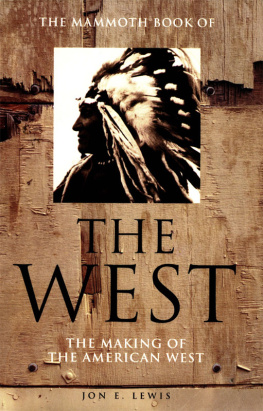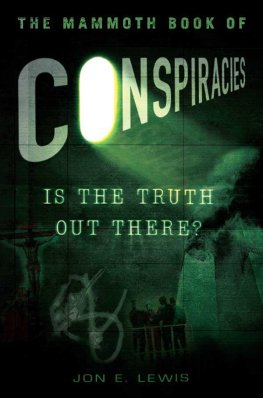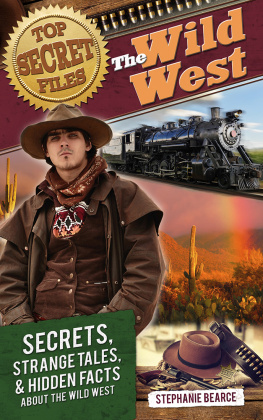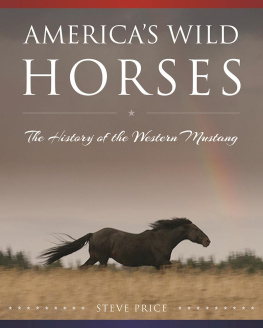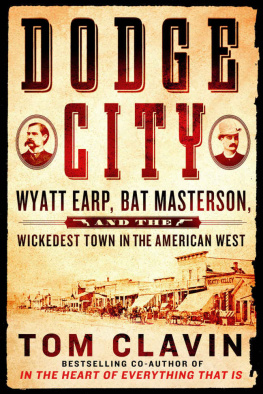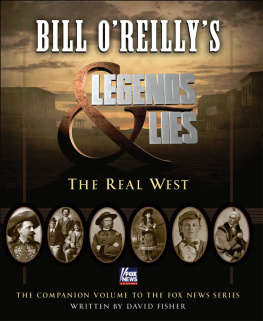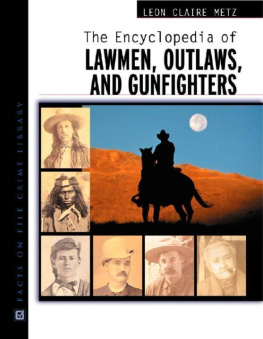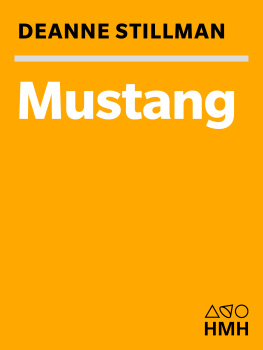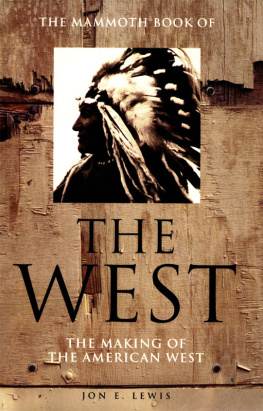The Mammoth Book of
THE WEST
Also available
The Mammoth Book of Ancient Wisdom
The Mammoth Book of Armchair Detectives & Screen Crimes
The Mammoth Book of Arthurian Legends
The Mammoth Book of Best New Horror 2000
The Mammoth Book of Best New Science Fiction 13
The Mammoth Book of Bridge
The Mammoth Book of British Kings & Queens
The Mammoth Book of Cats
The Mammoth Book of Chess
The Mammoth Book of Comic Fantasy
The Mammoth Book of Dogs
The Mammoth Book of Gay Erotica
The Mammoth Book of Great Detectives
The Mammoth Book of Heroic and Outrageous Women
The Mammoth Book of Historical Detectives
The Mammoth Book of Historical Erotica
The Mammoth Book of Historical Whodunnits
The Mammoth Book of How It Happened
The Mammoth Book of International Erotica
The Mammoth Book of Jack the Ripper
The Mammoth Book of Jokes
The Mammoth Book of Legal Thrillers
The Mammoth Book of Lesbian Erotica
The Mammoth Book of Life Before the Mast
The Mammoth Book of Men OWar
The Mammoth Book of Murder and Science
The Mammoth Book of New Erotica
The Mammoth Book of New Sherlock Holmes Adventures
The Mammoth Book of Oddballs and Eccentrics
The Mammoth Book of Puzzles
The Mammoth Book of Private Lives
The Mammoth Book of Seriously Comic Fantasy
The Mammoth Book of Sex, Drugs & Rock n Roll
The Mammoth Book of Short Erotic Novels
The Mammoth Book of Soldiers at War
The Mammoth Book of Sports & Games
The Mammoth Book of Sword and Honour
The Mammoth Book of Tasteless Lists
The Mammoth Book of the Third Reich at War
The Mammoth Book of True War Stories
The Mammoth Book of 20th Century Ghost Stories
The Mammoth Book of UFOs
The Mammoth Book of Unsolved Crimes
The Mammoth Book of War Correspondents
The Mammoth Book of War Diaries and Letters
The Mammoth Book of
THE WEST
The Making of the American West
Jon E. Lewis
ROBINSON
London
Constable & Robinson Ltd
5556 Russell Square
London WC1B 4HP
www.constablerobinson.com
First published in the UK by Robinson Publishing 1996
This new edition published by Robinson,
an imprint of Constable & Robinson Ltd., 2001
Copyright J. Lewis-Stempel 1996, 2001
All rights reserved. This book is sold subject to the condition that it shall not, by way of trade or otherwise, be lent, re-sold, hired out or otherwise circulated in any form of binding or cover other than that in which it is published and without a similar condition including this condition being imposed on the subsequent purchaser.
A copy of the British Library Cataloguing in
Publication Data is available from the British Library.
ISBN 1841193542
eISBN 9781780337005
Printed and bound in the EU
Jon. E Lewis was born in 1961. His previous books include the best-selling The Mammoth Book of How It Happened: An Eyewitness History of the World, Eye-witness the 20th Century and Eye-witness D-Day. Other titles in the Mammoth series are The Mammoth Book of Soldiers at War, The Mammoth Book of Life Before the Mast, The Mammoth Book of Endurance and Adventure, The Mammoth Book of War Letters and Diaries, The Mammoth Book of True War Stories, The Mammoth Book of Modern War Stories, The Mammoth Book of Battles, The Handbook of SAS & Elite Forces and The Mammoth Book of Private Lives.
Contents
Part I
The Way West
Part II
The Trampling Herd
Part III
The Lawless Land
Part IV
The Indian Wars
Part V
The Last Days of the West
Introduction
The American West was a time, and a place. But above all, it was a state of mind.
For pioneers staring, hip-cocked, into the virgin land of the setting sun, the West represented a new start, a future of endless possibilities, a place where a man or woman might make something of themselves. Wrote Helen Carpenter in her diary on 26 May 1857, the day she began her journey across the plains in an ox wagon: Ho for California at last we are on the way only seven miles from home (which is to be home no longer) yet we have really started and with good luck may some day reach the promised land.
The promised land of the West did not always turn out to be the Eden of pioneer expectations. Oh, the trees, the trees, lamented one settler in Kentucky, faced with the awesome task of clearing the looming, claustrophobic forest. Yet, whether they liked it or loathed it, those who endured life on the remote frontier became transformed, even as they transformed the land around them. They became less urbane, less European in outlook. The frontier mentality thus formed was independent, optimistic, eager for material success, and scornful of rank, pretension, and class. Nearly all travellers to the New World noted these pronounced traits. The English writer Anthony Trollope, visiting the USA in the early 1860s, commented in his North America (1862) that there is an independence which sits gracefully on their [the Americans] shoulders, and teaches you at first glance that the man has a right to assume himself your equal.
This frontier spirit was born long before men and women moved to settle the big, rolling lands beyond the Mississippi. Although the decades 18601890 are often equated with the American West, the frontier, the moving edge of settlement into the wilderness, began on the Eastern side of the Appalachians in the seventeenth century. The final sweep of settlement, the conquering of trans-Mississippi America, was but the finale of a process which had been hundreds of years in the making. Many of those who homesteaded the Great Plains were the descendants of farmers who had toiled on land of the Eastern coastal belt. And pioneers nearly always went West, not North or South, so keeping within familiar climatic zones. New Englanders stuck to the upper reaches of the West; Virginians and Carolinians headed for Alabama, and then crossed the Mississippi into Louisiana, Arkansas, and Texas.
Land for farming was the great spur which prompted men and women to go West. (The cowboy on horseback might be a more romantic, attractive figure, but it was the pedestrian sod-buster who tamed the bulk of the West; agriculture was the new countrys basic endeavour.) Sons of farmers, on finding the family claim too small to sustain division, left home and trekked west to find a place of their own. And then, in turn, their sons did the same. Southerners also found themselves driven westwards by soil exhaustion; their cash crops of tobacco and cotton took a heavy toll on the earth. The relative abundance of land did little to encourage good husbandry. There always seemed to be more land for the taking.
That is, for the taking from the continents original inhabitants, the American Indian. For the land the settlers thirsted for was not unoccupied; the Indians had to be persuaded to part with it, or prised off it by force. If the frontier mentality had attractive features, it also had ugly aspects. It justified the cleansing of Indians from their lands in the name of Manifest Destiny, and encouraged the cult of the gun, the use of firearms to settle all matters, big or small. To win the West took the White man nearly three hundred years of warfare.

